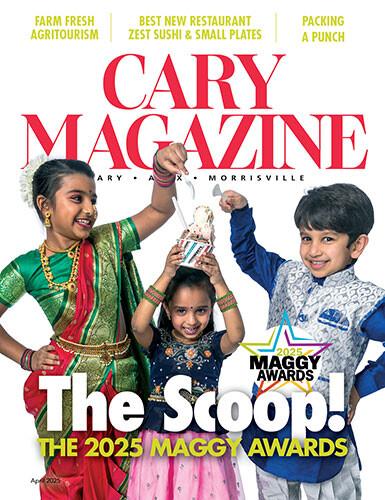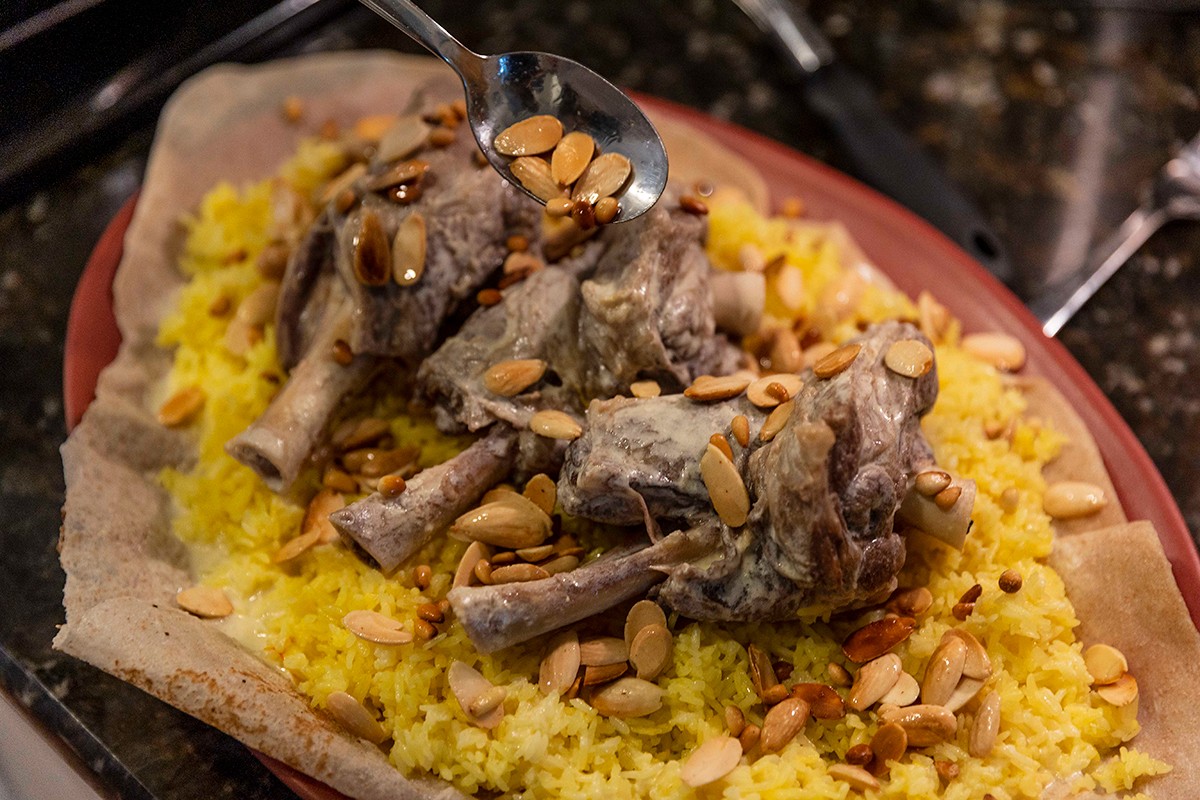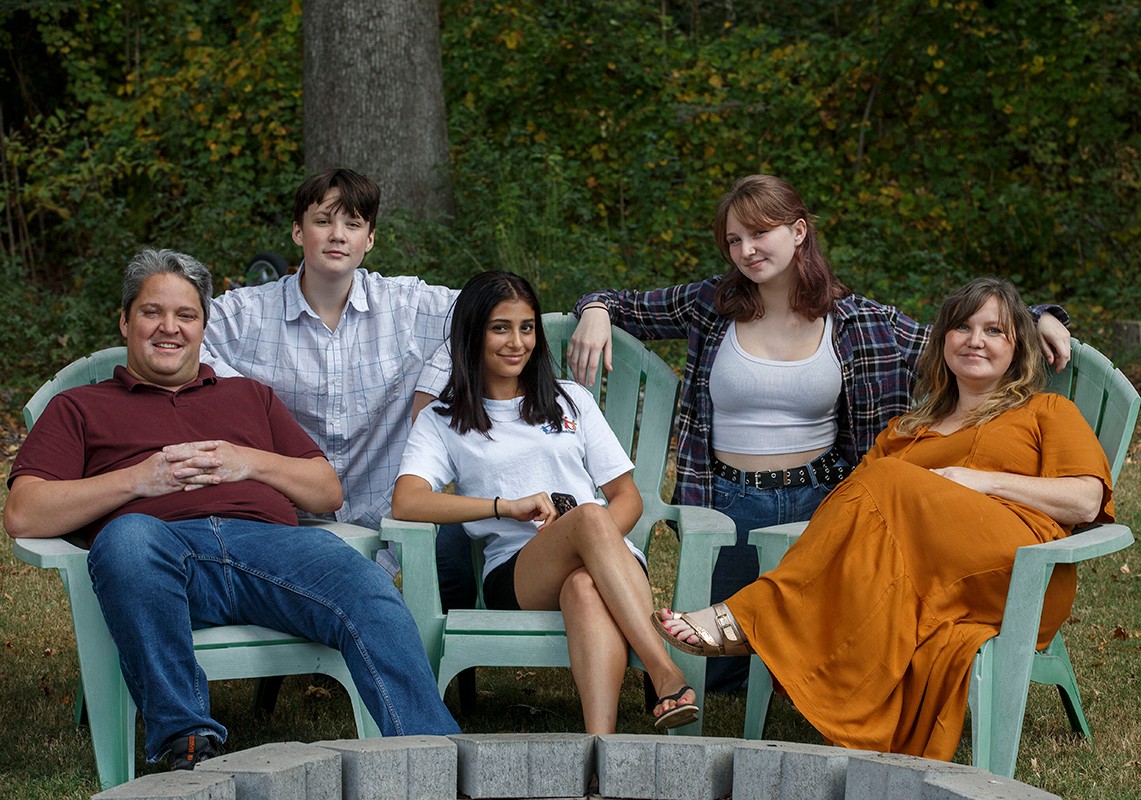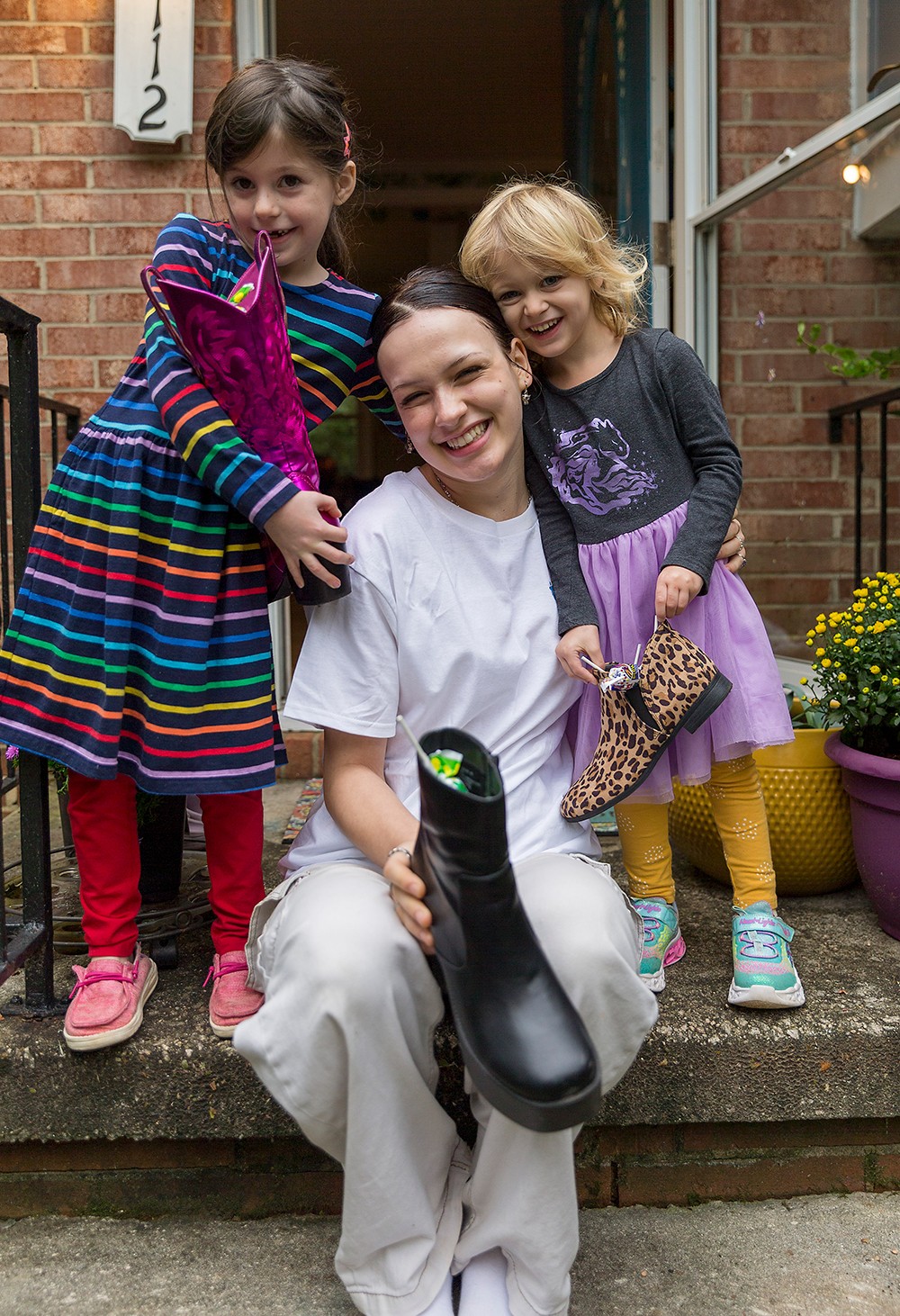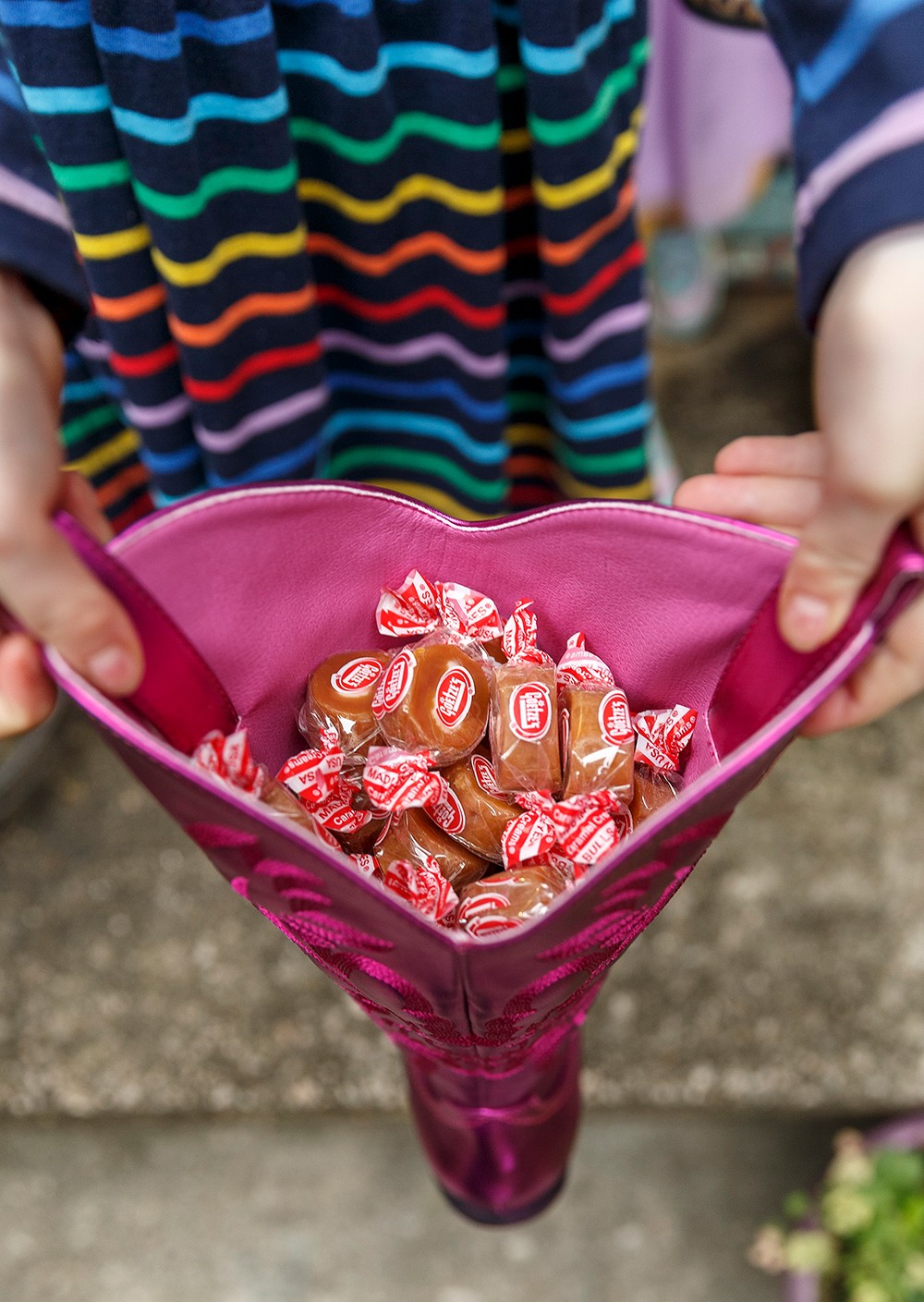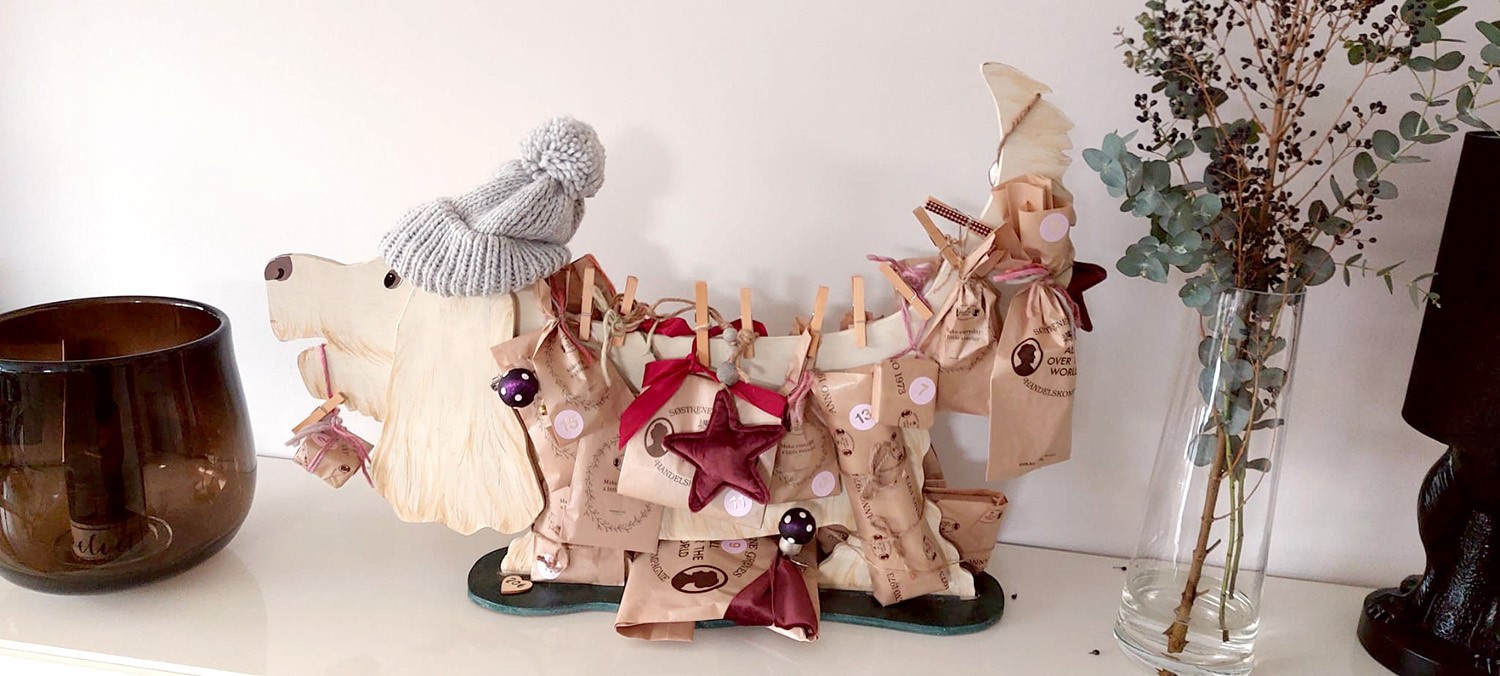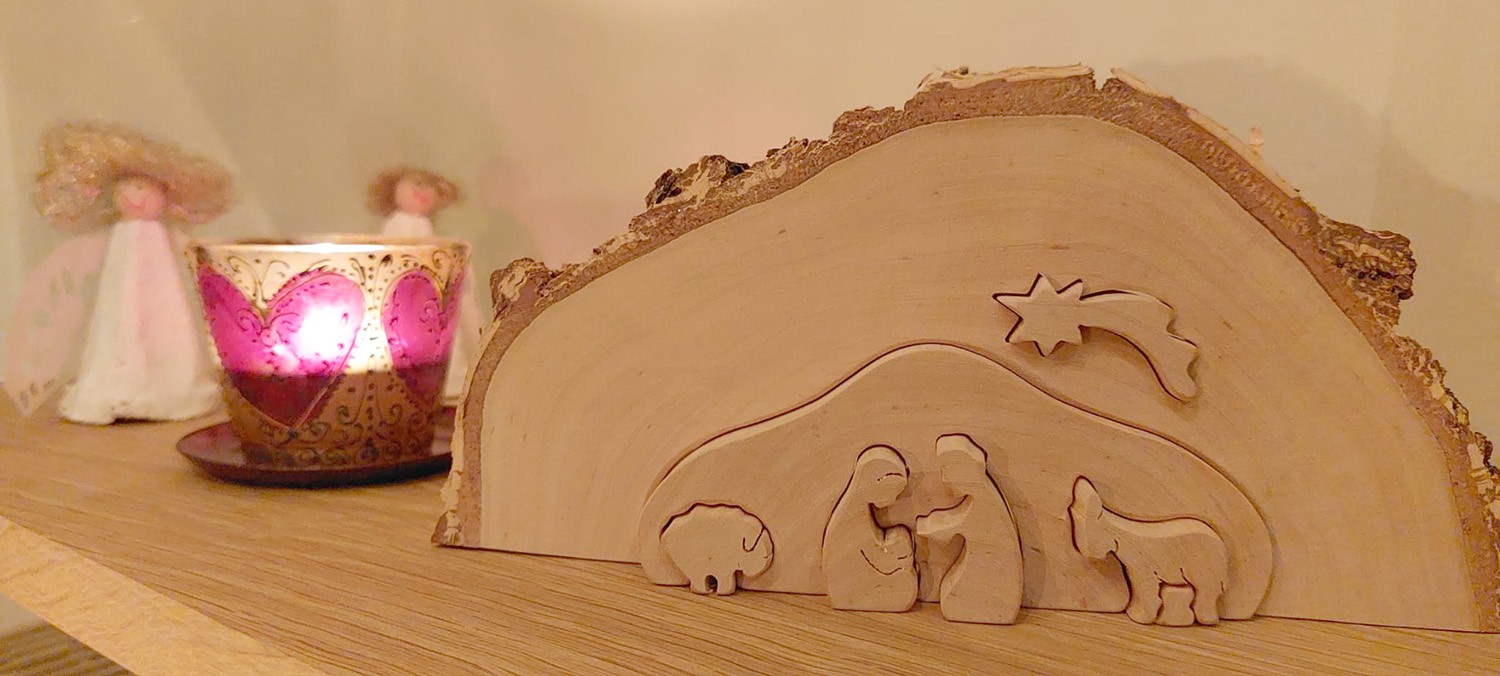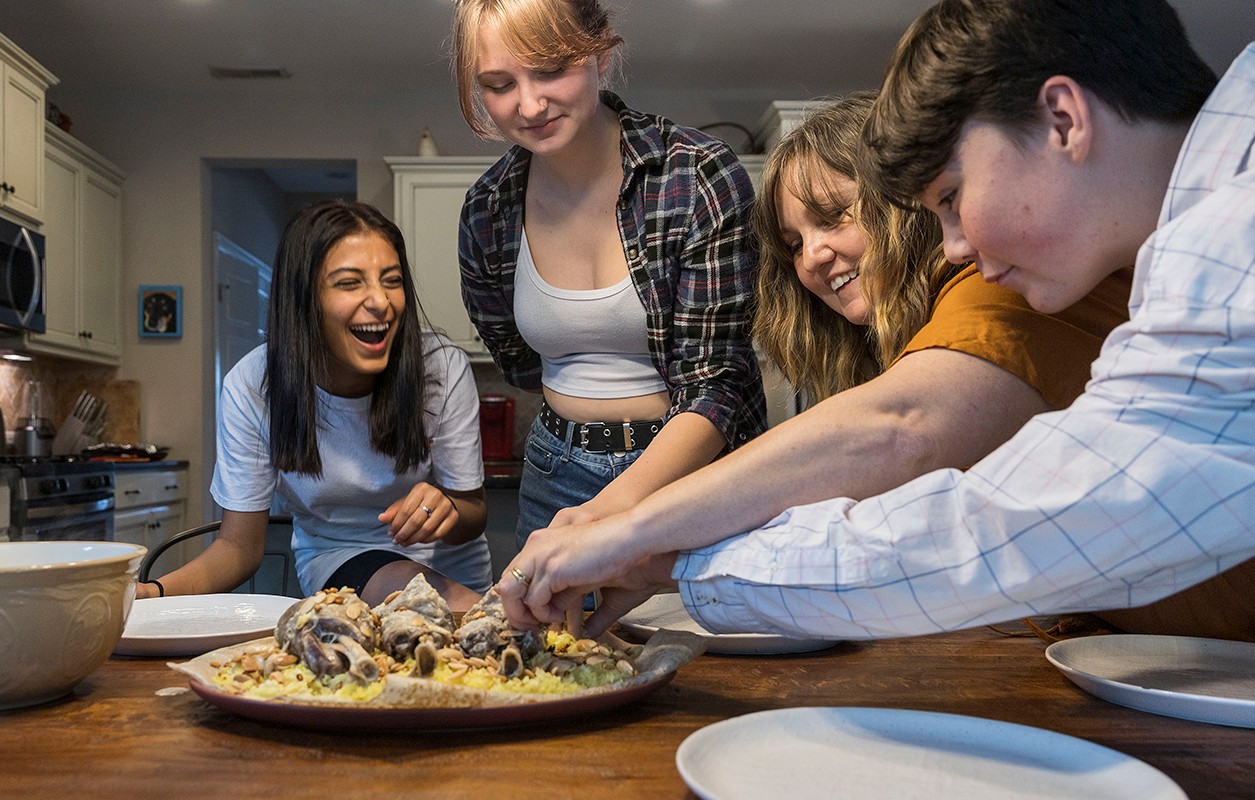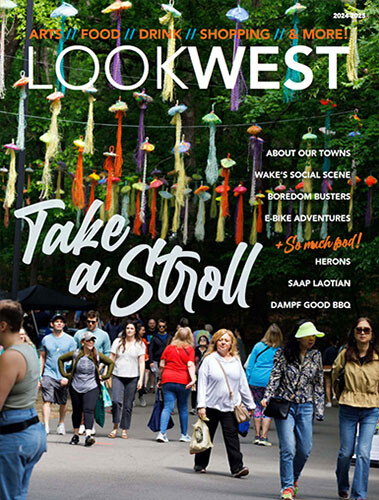If you love kids, have a spare bed, and can provide transportation to events, then you’re the perfect candidate. It doesn’t matter if you have your own children or not, if you’re single or married, working or retired — anyone who loves teenagers can be a wonderful host parent!
— Dana Kruse, host parent
Crystal Allis is no stranger to strangers. The founder and executive director of Borderless Friends Forever (BFF), an exchange student organization headquartered in Cary, is currently hosting Daniel Gallese and Joan Bauez Perez — the 32nd and 33rd exchange students to enter her home over the course of almost 20 years.
Allis, who stumbled across an advertisement for hosting exchange students 17 years ago, jumped into hosting with both feet, opening her home to a (literal) world of change. After hosting a student from Germany, Allis went on to work with exchange students as a community adviser and regional director with other organizations prior to starting BFF.
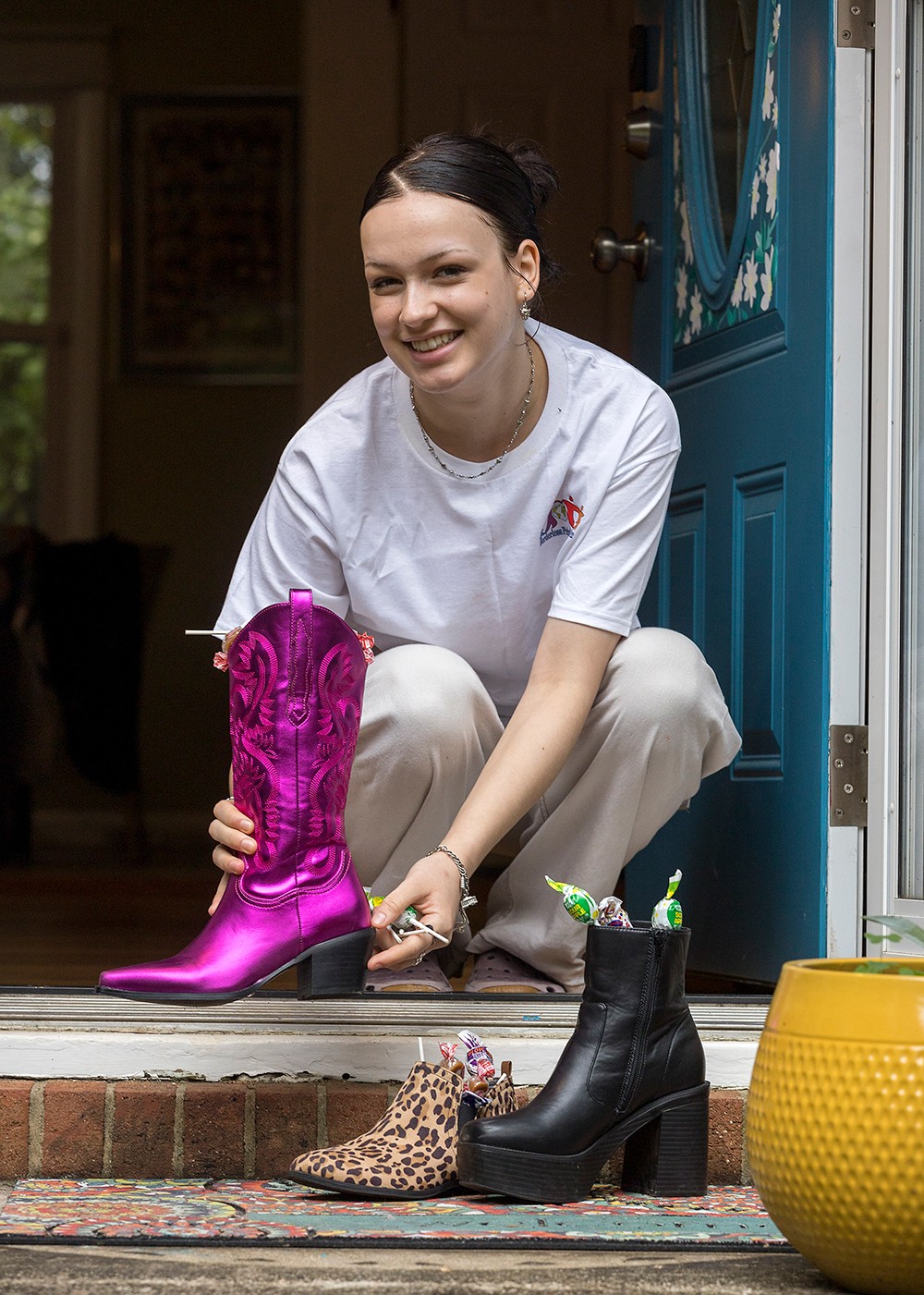
Ebba, who will experience Hanukkah with her host family in NYC, is excited to celebrate St. Nicholas Day with (her) host family on Dec. 6.
“I just loved it, and I became engrossed in the idea of sharing and learning about other people’s cultures,” said Allis. “One of the things we always say is we can celebrate the similarities, but we can also celebrate the differences. We tell them over and over, it’s not bad or good, it’s just different — so I think that’s something that my family has benefited from throughout the years. The world seems smaller, but yet bigger at the same time.”
Cultural and religious differences are most often highlighted during the holidays, a time when exchange students are tossed into a world of turkey and cranberry sauce, annual family get-togethers, cookie decorating parties, and often unfamiliar religious observances and customs. For host families, the holiday season presents the perfect opportunity to learn about and incorporate the myriad traditions that their exchange students bring to the table.
“I think it’s important to acknowledge their holidays and traditions because it is a cultural exchange, not just a ‘come here and learn about America,’” said Allis. “It’s supposed to be an exchange of thoughts and ideas and a learning experience for both the host family and the student.”
Allis’ two students, who are both attending Cary High School for their junior year, are excited to celebrate the holidays in North Carolina and plan on incorporating unique traditions from their home countries.
“I am looking forward to eating the big bird on Thanksgiving,” said Gallese, from Italy. “I also want to see how the town decorates for Christmas. At New Year’s, I will try to make a special New Year’s dish called cotechino (it’s a meat).”
Perez, from Spain, has another dish in mind that he hopes to add to the holiday spread: crespells, traditional cookies shaped with the help of molds. For the new year, Perez says he will make his host family eat 12 grapes at midnight (a grape for every chime of the clock). In Spain, consuming all 12 grapes on Nochevieja, or New Year’s Eve, is believed to bring good luck in the coming year.
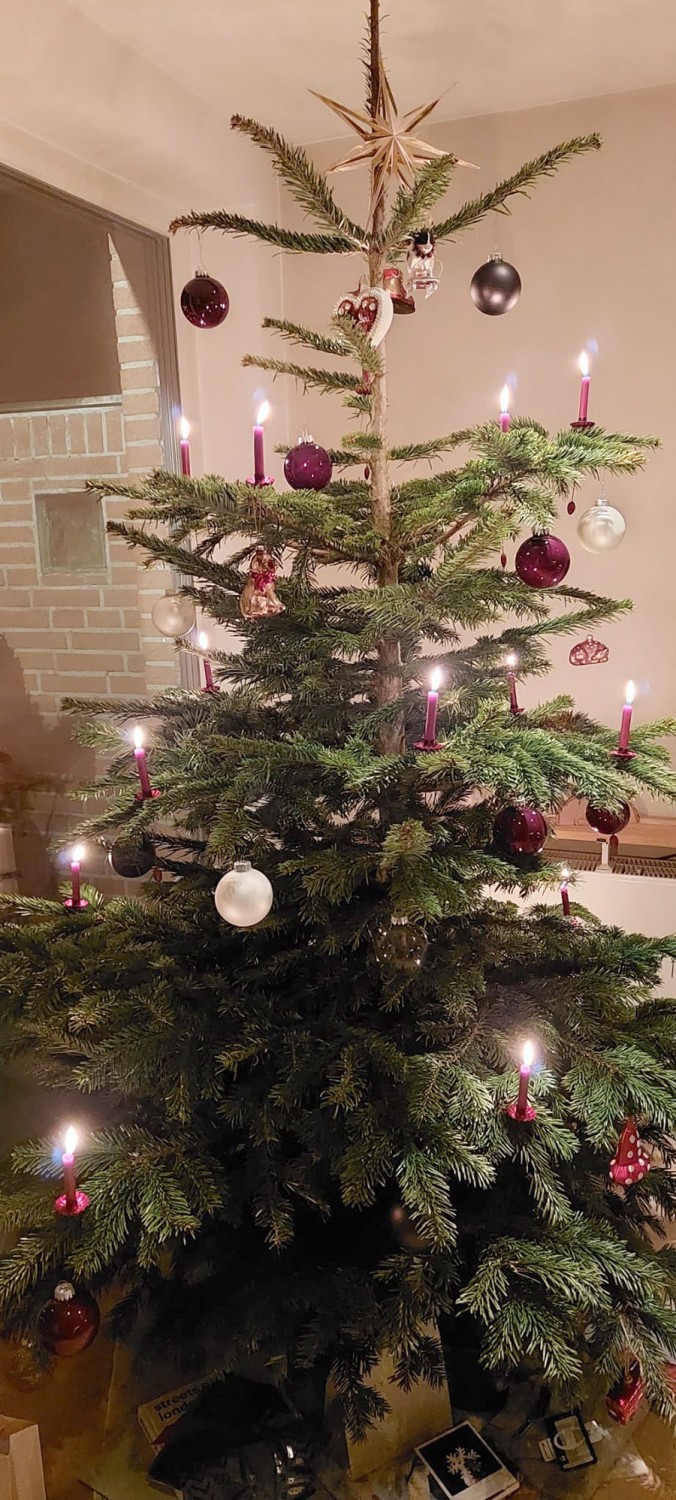
Many German families still decorate their trees in the altdeutsche Tradition, or the old German way, complete with real candles. Contributed photo.
On the evening of January 5, Perez will celebrate Three Kings Day with his host family. This two-day holiday, marked by colorful parades and a gift exchange for children, celebrates the arrival of the three wise men in Bethlehem after Jesus’ birth. Perez will make a special cake for the occasion called roscón de reyes, a circular sweet bread sprinkled with sugar and dried fruits with a special surprise inside: a plastic king or a tiny Jesus (the finder gets special treatment for the day)!
“I know in Spain you actually clean your shoes the night before Three Kings Day and you leave them by the door, and I think St. Nick or the wise men come and leave candy inside your shoes,” said Allis. “We’ve done that in the past with another Spanish student, so I think we’ll also be incorporating that.”
As Allis always says, cultural exchanges are a two-way street. Kelly Jo Sigler, the program assistant at BFF and mother of three, has a whirlwind experience planned for her German exchange student, Ebba Heck.
“Ebba is from Germany, and she is staying with us for 10 months,” said Sigler. “We are traveling to Brooklyn, New York, for the week to celebrate Hanukkah in style! We are staying in one of the traditionally Hasidic neighborhoods so that we can view all of the Hanukkiah in the windows. We are going to ice skate in Central Park, buy some ‘I Love New York’ T-shirts, walk across the Brooklyn Bridge, and see a Broadway show. Ebba and I are both vegan, and we are excited to try out the many restaurants.”
Sigler, who was once an exchange student in Germany as a teenager, has enjoyed seeing the exchange experience from the other side and understands the importance of incorporating her student’s traditions over the holidays.
“The holiday season is traditionally a time when exchange students miss home, so I want to make sure that she has a piece of home. During our trip to New York, we plan on buying some souvenirs to send back to her family, and making Christmas cards to send to her friends back home. I plan on taking her to a traditional German bakery so that I can learn what her favorite cookies and cakes are. In Germany, you put your shoes out on December 6. Ebba is excited to fill the girls’ shoes with German candy.”
Host parents Dana and Mark Kruse are hosting two boys, Danas from Lithuania and Enes from Turkey. The exchange year is all about experiencing new things, says Dana, and inviting others to participate in our own celebrations helps us remember why they’re so important to us.
“I am so excited for Christmas because I have seen it a lot in movies and I get to see it in reality,” said Enes.
Danas is excited to bring a taste of Lithuania to the table over the holidays.
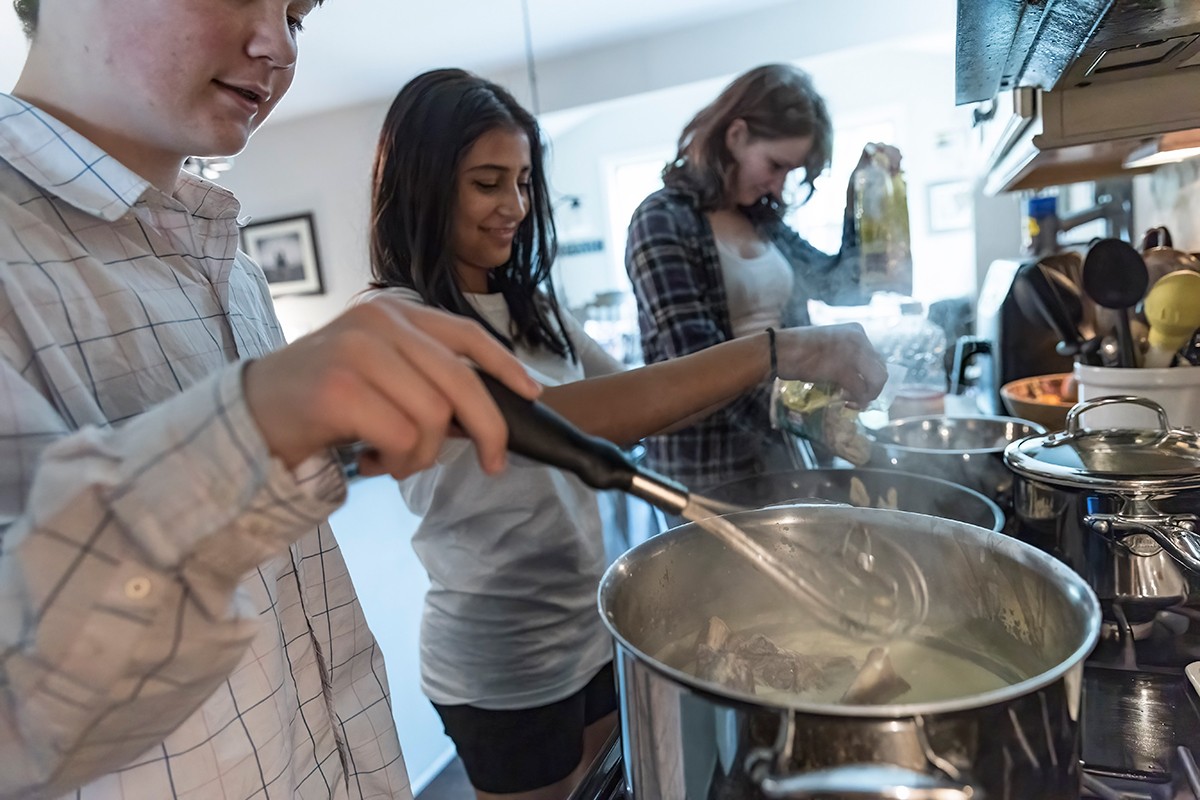
Tia Shalabi (center), stands over a hot stove and teaches her host siblings, Abigail and Jacob Daw, ages 14 and 16, how to make mansaf, the traditional dish of Jordan.
“A Lithuanian tradition for Christmas I’d love to share would be making Kūčiūkai and eating that with poppy milk,” said Danas. “I really don’t know what to expect with Thanksgiving, since that’s a very American holiday, so probably just a very delicious turkey. And for New Year’s, I’d just like to spend time as a family.”
Autumn Buckner, a community adviser and host mom with BFF, will be celebrating Saint Nicholas Day, among other German traditions, with her host student, Zoe Savitis.
“On December 6, we celebrate St. Nikolaus. The day before, you clean your shoes and put out sugar and water for Nikolaus’ donkey at the front door. In the morning, the shoes are filled with nuts, oranges, and chocolate,” said Savitis.
“Another one of my favorite traditions is the Adventskalender (advent calendar). Every day from December 1 through 24, you get a small present, some candy, or just a cute poem. It’s so much fun to open it every morning! Another favorite is eating raclette, a melted cheese dish. We either eat it on Christmas evening, on New Year’s Eve, or on both evenings. It’s so tasty, and you can eat it with many people. It takes time, which is perfect for spending the evening together and waiting for the new year.”
For students like Tia Shalabi, a participant in the YES Abroad program — a merit-based scholarship available to high school students from select countries with significant Muslim populations — the upcoming holidays are a complete unknown.
“I’m very excited about trying new things like Christmas and Easter, because we don’t celebrate them in Jordan,” said Shalabi. “For Thanksgiving, I would love to make mansaf, the most known dish in Jordan. It’s rice with something called jameed, and it’s mostly made with lamb. Mansaf has a lot of tradition behind it — when it’s served, we have to put our right hand behind our backs and eat it with our hands.”
For Shalabi, many of her traditions will get shared during the month of Ramadan — a time of dawn-to-sunset fasting and prayer culminating in a celebratory feast called Eid al-Fitr.
“We’re going to try to make a lot of Arab dishes for my family to try. For Eid, we’re going to try and make mamoul, a filled butter cookie, but I don’t know if it’s going to work. I’m not a chef,” said Shalabi, laughing.
For those who are interested in hosting and wrapping their arms around the world, visit borderlessfriends.org.
- Hosting the Holidays
- The 2022 Gift Guide
- Celebrating Kwanzaa
- In Honor of Hanukkah
- Small Bites, Big Taste
- A Lesson in Thankfulness
- Things to Do: November / December 2022
- Erica Chats: Who Loves a Good Holiday Tradition?
- Small Business Spotlight: Stylish Living
- Nonprofit Spotlight: Family Promise of Wake County
- On Trend: Beer Advent Calendars
- Liquid Assets: Holiday Bash by Raleigh Brewing
- Liquid Assets: Santa’s Smashed
- Garden Adventurer: Color Your Indoor World with Calathea
